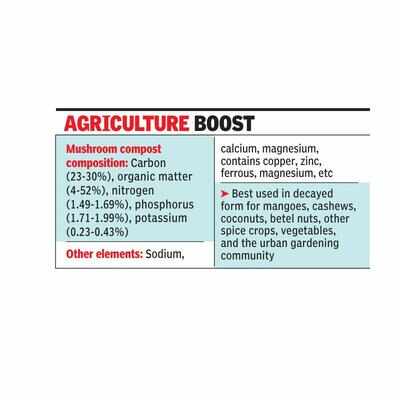Trending Topics
Mushroom compost gains in popularity among Goan ryots

Panaji: Goan farmers have for years preferred using kitchen waste as fertiliser for crops, and in the past two decades, the blend has evolved from common kitchen ingredients to vermicompost. The latest kind of compost being embraced by Goan farmers is made from mushrooms and is drastically cheaper than vermicompost.
“A full dumper truck containing 6.5 tonne of mushroom compost costs around Rs 7,000. This is around Rs 1 per kg as opposed to Rs 15 per kg of vermicompost,” agriculturist Sachin Tendulkar told TOI.
Button mushroom producing factories are majorly responsible in the production of several tonnes of compost that is made from leftover edible fungi. In Goa, it is currently prepared in Canacona and Usgao.
Many farmers and kitchen gardeners have been making use of mushroom compost for the past three to four years to cultivate cashew, kulagar crops and leafy vegetables.
However, mushroom compost doesn’t act as a substitute for vermicompost. It is currently used by farmers as a filler material along with manure, cow dung, rock phosphate and potash.
With its high-water absorption capacity, the compost holds well in sandy, laterite and gravel soil and owing to its organic carbon and microbes and succulency, farmers said that the compost in decayed form is very good for vegetable cultivation. For cashew, however, regulated use of mushroom compost is required.
Learning from trial-and-error, farmers in Goa also believe that mushroom compost must not be used immediately after purchase, but must be kept for a few weeks to decompose.
“We can use the compost by rotting it in the garden for a few days. If the compost is used immediately, farmers will need to water the crops liberally,” a farmer said.
However, farmers have been cautioned to keep the compost moist during the process of decomposing.
“The compost promotes breeding of rhinoceros beetle, which lay eggs there and ultimately attack coconut trees around. Adding beauveria bassiana fungal culture during decomposing and using rhinoceros beetle traps with lures in coconut gardens is advised,” said Satish T, a farmer.
“A full dumper truck containing 6.5 tonne of mushroom compost costs around Rs 7,000. This is around Rs 1 per kg as opposed to Rs 15 per kg of vermicompost,” agriculturist Sachin Tendulkar told TOI.
Button mushroom producing factories are majorly responsible in the production of several tonnes of compost that is made from leftover edible fungi. In Goa, it is currently prepared in Canacona and Usgao.
Many farmers and kitchen gardeners have been making use of mushroom compost for the past three to four years to cultivate cashew, kulagar crops and leafy vegetables.
However, mushroom compost doesn’t act as a substitute for vermicompost. It is currently used by farmers as a filler material along with manure, cow dung, rock phosphate and potash.
With its high-water absorption capacity, the compost holds well in sandy, laterite and gravel soil and owing to its organic carbon and microbes and succulency, farmers said that the compost in decayed form is very good for vegetable cultivation. For cashew, however, regulated use of mushroom compost is required.
Learning from trial-and-error, farmers in Goa also believe that mushroom compost must not be used immediately after purchase, but must be kept for a few weeks to decompose.
“We can use the compost by rotting it in the garden for a few days. If the compost is used immediately, farmers will need to water the crops liberally,” a farmer said.
However, farmers have been cautioned to keep the compost moist during the process of decomposing.
“The compost promotes breeding of rhinoceros beetle, which lay eggs there and ultimately attack coconut trees around. Adding beauveria bassiana fungal culture during decomposing and using rhinoceros beetle traps with lures in coconut gardens is advised,” said Satish T, a farmer.
Start a Conversation
FOLLOW US ON SOCIAL MEDIA
FacebookTwitterInstagramKOO APPYOUTUBE










